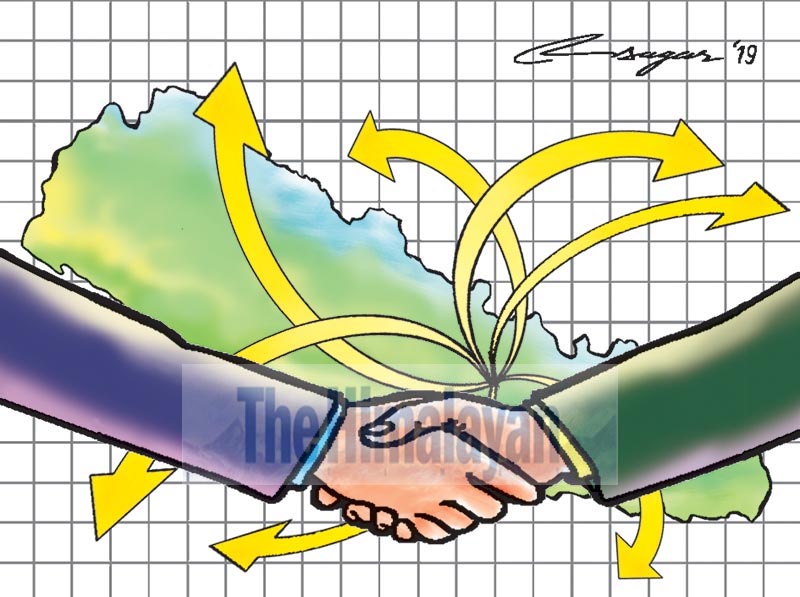Building diplomatic capital: A formidable challenge
To promote Nepal’s diplomatic capital, sustained efforts at reforming and improving the organisational set-up and people engaged in diplomatic activity should be initiated. Tinkering and piecemeal acts will not be of any value
Diplomacy today is different from what it used to be in the Cold War era and the unipolar world days. Its trend is shifting from the state authorities to non-state actors. The world today looks chaotic. Narrow nationalism in contrast to liberalism is visibly on the rise. As a consequence, globalisation is giving in to slowbalisation, which has put the global order in disarray. The established global rule and regulatory process are now being derailed, much to the disquiet and disadvantage to the weaker countries.
Under such circumstances, the conduct of diplomacy has given space to a new style and substance. Eminent experts point out that the evolving pattern of earning genuine diplomatic capital nudges us to ponder over capitalising on the current trend. More so, in the case of an individual country’s relationship with its immediate neighbours and other distant powers.
Well-known practitioners of modern diplomacy define diplomatic capital as an art of enabling the statecraft to earn trust and goodwill from abroad by fostering diplomatic capability and invigorating the envoys to conduct diplomatic activities positively. They emphasise that diplomatic capital is innately linked with goodwill and trust maintained among nations beyond the border. This stream of diplomacy substantially differs from what is called financial, political and social capital, which remains within the border, albeit with linkages with the outside world, because connectivity and codependency have come to occupy a larger space in international dealings.
Tellingly though, acquiring diplomatic capital is not an easy job. Sporadic efforts even by an eminent diplomat in his individual capacity would not work. Collective efforts and well-thought-out planning need to be geared up to get along with the conduct of diplomatic activity sustained by diplomatic capital.
Needless to say, utilising diplomatic capital is possible only when the domestic situation supports and substantiates its process. Unless stability reigns at home, it becomes useless abroad. No trust and goodwill can be earned from abroad to contribute to its enhancement. The domestic ambience has much to do with it.
The domestic environment, on which stands the normalcy of socio-political reality, greatly helps strengthen diplomatic capital. Therefore, the domestic situation needs to be nurtured if any meaningful diplomatic gain is to be achieved. Trust and goodwill will not be forthcoming when the internal situation remains uncertain and non-reliable with political bickering at play.
Positing diplomatic capital appropriately for managing the external affairs would certainly add to the political strength and dignity of a weaker country to a broader extent by pursuing uprightness and judiciousness. This would enhance the global standing of the country even during disturbing times such as now.
It must be noted that the leading and serving diplomats of Nepal abroad must ensure the diplomsatic capital of Nepal with their valued knowledge, skills and experience put in the service of the country. That would indisputably help Nepal find an iconic diplomatic niche abroad.
However, the question is, how can diplomatic capital be gained and sustained for long to brand a country as a responsible member of the international community at a time when the world is perceived to be in disorder? Established democracies are being stirred and, in some cases, torn apart. At the moment, no superpower is in a position to put the global situation in order.
To a weaker and economically yet-to-be self-reliant country, gaining diplomatic capital is a formidable challenge. The built-in mechanism of the diplomatic set-up at home and efficacy of diplomatic missions abroad must be doing something concretely for improving and strengthening the institutional capability by enhancing diplomatic knowledge and professional skills of the working diplomats of every rank. These essential qualities should be commensurate with the emerging development of diplomatic practices, which are now being clearly influenced by the powerful corporate bodies and information technology giants around the globe.
Under the current circumstances where the financial and technical power is visibly shifting to the non-state actors on a wider scale, the conduct of diplomacy at the government-to-government level with the desk-tied behaviour and practice is inadequate, although the conventional system is still valid as handed down through the centuries.
To promote the diplomatic capital of Nepal, sustained efforts at reforming and improving the organisational set-up and people engaged in diplomatic activity should be initiated. That will naturally pay off. Tinkering and piecemeal acts will not be of any service and value. Now is certainly an opportune moment, which is supported by political stability, to enhance the diplomatic capital to deal with the external world. This will help in image-building of the country in the world at large.
Sustained domestic stability, diplomatic mechanisms manned by skilled personnel with high communication caliber to engage in a foreign cultural diplomatic environment to represent national interest and, above all, a steadfast commitment to pursue diplomatic duties are essential ingredients that could enliven diplomatic capital. Do we really possess such elements?






